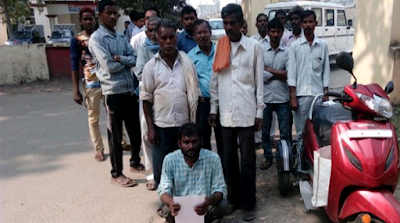Mystery of missing persons: 150 workers "might have" died during Unchahar explosion in Uttar Pradesh
 |
| Workers at the power plant |
The tearing hurry in commissioning the unit VI of Unchahar Thermal Power project, Raebareli, Uttar Pradesh, violating all safety norms, is the key reason for the explosion at the project on November 1, a report released in Delhi at a function held on the International Human Rights Day (December 10) said.
Titled, “How Many Deaths Will It Take: A Preliminary Report on Unchahar Tragedy” it said that the number of deaths is underreported and migrant labourers with no formal training, nor safety gears, are forced to carry out critical operations of the project, and many migrant workers are still missing, and their whereabouts are not known to anyone.
 |
| Missing persons: Document on display |
Most of the labourers suffered burns of 50-70%, and doctors are of the opinion that even if they recover from injury, they would be impaired for life, and the ones with very severe burns might not live more than three to four months, the report said.
Addressing a gathering at the release of the report release ceremony, Urmila, sister of Awadhesh Jaiswal, who died in the accident, said, “There are more deaths than what the authorities are claiming. At the time of accident over 300 labourers were working near the Unit VI. At least 150 people might have died in the accident, many of them burned and buried in the ash.”
 |
| Family member displays missing person's I-card |
“Haste to complete the project ahead to schedule, ignoring basic norms, and criminal negligence towards safety procedures led to this ghastly incident,” he said. "The cost of unbridled development is that human lives are devalued and failure to hold authorities accountable in accidents like the one at Unchahar promotes more such accidents", he complained.
A member of the enquiry team, Awadhesh Kumar said that since most the labourers are migrant labourers from different states, they are employed through a contractor, and there are no records available on the details of them.
“We met many family members who were searching for their dear ones, who were working at the plant. Neither could they find them, nor the authorities are helping them find the missing people", he said, even narrating reported incidents of labour law violations at the plant.
 |
| The power plant |
Senior Congress party functionary Chandrakant Dubey, AK Jain of the All India Power Engineers Federation, Ashok Chowdhury of the All-India Union of Forest Working People, and Sreedhar Ramamurthi of the Mines, Mineral and People attended the report release function.
The report, published by Delhi Solidarity Group, recommended a judicial enquiry into the accident to investigate it thoroughly and to fix responsibility on the ones who erred.
It also recommended that the government should immediately constitute a task force to ascertain the whereabouts of the missing persons, provide adequate compensation and recommended that the Ministry of Power should carry out an audit of all coal power plants to ascertain the state of workers, adherence to safety measures and preparedness for emergencies.
---
Download the report HERE

Comments